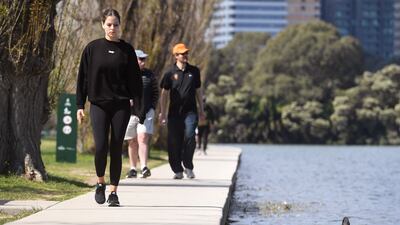An 11-minute brisk walk once a day could prevent one in 10 early deaths by lowering the risk of diseases such as heart disease, stroke and a number of cancers, research suggests.
If people manage to complete at least half of the weekly level of moderate activity recommended by the NHS, they could gain “substantial benefits”, according to Cambridge University analysis.
This equates to 75 minutes of moderate-intensity activity per week — or about 11 minutes per day — of the full NHS recommended weekly amount of 150 minutes.
Moderate-intensity physical activity raises your heart rate and makes you breathe faster but you would still be able to speak during the activity.
Examples include brisk walking, dancing, riding a bike, playing tennis or hiking.
“If you are someone who finds the idea of 150 minutes of moderate-intensity physical activity a week a bit daunting, then our findings should be good news,” Dr Soren Brage from Cambridge’s Medical Research Council Epidemiology Unit said.
“Doing some physical activity is better than doing none.
“This is also a good starting position — if you find that 75 minutes a week is manageable, then you could try stepping it up gradually to the full recommended amount.”
Exercises to control high blood pressure — in pictures
Researchers from the MRC looked at results reported in 196 peer-reviewed articles, covering more than 30 million participants from 94 large-study cohorts.
The study team examined the association between physical activity levels and risk of heart disease, cancer and early death.
They observed that, outside of work-related physical activity, two out of three people reported activity levels below 150 minutes per week of moderate activity.
Fewer than one in 10 managed more than 300 minutes per week.
Broadly speaking, they noted that additional benefits in terms of reduced risk of disease or early death were marginal beyond 150 minutes per week of moderate activity.
But even half of this amount came with significant benefits.
Accumulating 75 minutes per week of moderate intensity activity brought with it a 23 per cent lower risk of early death.
And 75 minutes per week of moderate activity was also enough to reduce the risk of developing cardiovascular disease by 17 per cent and cancer by 7 per cent.
“We know that physical activity, such as walking or cycling, is good for you, especially if you feel it raises your heart rate,” said James Woodcock of the MRC Epidemiology Unit.
“But what we’ve found is there are substantial benefits to heart health and reducing your risk of cancer even if you can only manage 10 minutes every day.”
Get into shape with these five top exercises for women — in pictures
The researchers calculated that if everyone in the studies had done the equivalent of at least 150 minutes per week of moderate activity, about one in six (16 per cent) of early deaths would be prevented.
However, even if everyone managed at least 75 minutes per week of moderate-intensity physical activity, about one in 10 early deaths would be prevented, the research showed.
One in 20 cases of cardiovascular disease and nearly one in 30 cases of cancer would be prevented, the analysis suggested.
“Moderate activity doesn’t have to involve what we normally think of exercise, such as sports or running,” said Leandro Garcia of Queen’s University Belfast.
“Sometimes, replacing some habits is all that is needed.
“For example, try to walk or cycle to your work or study place instead of using a car, or engage in active play with your kids or grandkids.
“Doing activities that you enjoy and that are easy to include in your weekly routine is an excellent way to become more active.”
The research has been published in the British Journal of Sports Medicine.











